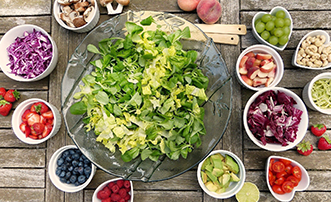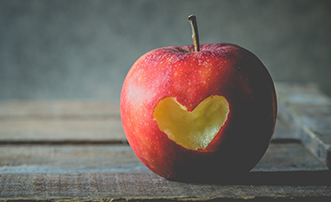Nutrition plays an important role in falls prevention. Poor nutrition impacts your overall health and can cause frailty, which increases your risk of falling. Those who have fallen are more often malnourished than people who haven’t fallen, one study finding that those who have fallen are almost twice as likely to be malnourished (NIH.gov). There are some things we can do to maintain good nutrition and help prevent falls.
Eat Balanced, Healthy Meals
My Plate is a good place to start when building a balanced plate. My Plate recommends:
- 1/2 of your plate should be fruits and vegetables. Fruits and vegetables contain a lot of vitamins and minerals to help us stay healthy and to help our bodies carry out every day functions. They also have high amounts of fiber and low in fat, calories, and sodium.
- 1/4 of your plate should be protein. Some examples of protein you can add to your plate are beef, poultry, seafood, eggs, beans, peas, lentils, nuts, and seeds. Protein helps to maintain and repair our muscles. It is also the building block for out muscles, bones, blood, and hormones.
- 1/4 of your plate should be grains and half of that should be whole grains. Whole grains provide many nutrients and fiber. Fiber may help reduce your cholesterol and lower your risk for heart disease.
- Add dairy such as milk, yogurt, and cheese for extra protein and calcium.
Eat Regularly – Try not to skip meals
Skipping meals can cause your blood sugar to become low. If it’s been a long time between meals, your blood sugar can become low enough where it causes dizziness and light-headedness, which could lead to a fall. If you aren’t hungry for a full meal, try a healthy snack such as cottage cheese, fresh fruits or vegetables, yogurt, oatmeal, 1/2 sandwich, hard boiled egg, or cheese with whole grain crackers.
Stay Hydrated
Becoming dehydrated due to not getting enough fluids can cause your blood pressure to decrease, causing dizziness and confusion, which can then lead to a fall. Try to drink 6 – 8 8 oz. cups of water each day. Keep a refillable water bottle with you to refill when you need. Always having water with you makes it easy to remember to drink throughout the day.
Water-dense fruits and vegetables can contribute towards hydration. Some fruits and veggies that are high in water content are cantaloupe, strawberries, watermelon, bananas, grapes, oranges, pears, pineapple, lettuce, cabbage, celery, cucumbers spinach, carrots, broccoli, and avocados.
Falls are prevalent among older adults and there are many things we can do to help prevent a fall, including being sure we are getting adequate nutrition, eating frequently, and staying hydrated.
Sources: myplate.gov, nhsinform.scot




